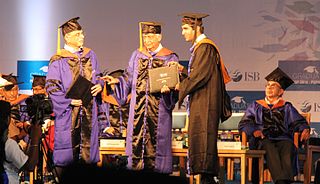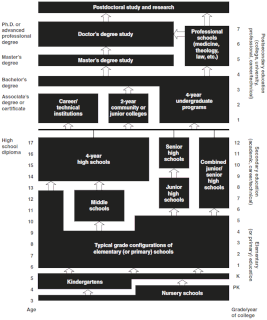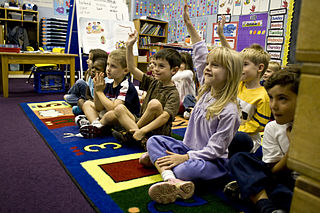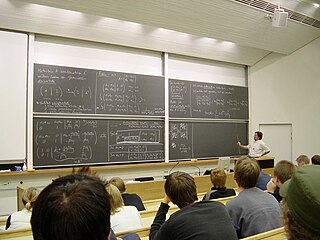 W
WAdult education, distinct from child education, is a practice in which adults engage in systematic and sustained self-educating activities in order to gain new forms of knowledge, skills, attitudes, or values. It can mean any form of learning adults engage in beyond traditional schooling, encompassing basic literacy to personal fulfillment as a lifelong learner.
 W
WA college is an educational institution or a constituent part of one. A college may be a degree-awarding tertiary educational institution, a part of a collegiate or federal university, an institution offering vocational education, or a secondary school.
 W
WEarly childhood education is a branch of education theory that relates to the teaching of children from birth up to the age of eight. Traditionally, this is up to the equivalent of third grade. ECE emerged as a field of study during the Enlightenment, particularly in European countries with high literacy rates. It continued to grow through the nineteenth century as universal primary education became a norm in the Western world. In recent years, early childhood education has become a prevalent public policy issue, as municipal, state, and federal lawmakers consider funding for preschool and pre-K. The global priority placed on early childhood education is underscored with targets of the United Nations Sustainable Development Goal 4. It is described as an important period in a child's development. It refers to the development of a child's personality. ECE is also a professional designation earned through a post-secondary education program. For example, in Ontario, Canada, the designations ECE and RECE may only be used by registered members of the College of Early Childhood Educators, which is made up of accredited child care professionals who are held accountable to the College's standards of practice.
 W
WEducational management refers to the administration of the education system in which a group combines human and material resources to supervise, plan, strategise, and implement structures to execute an education system. Education is the equipping of knowledge, skills, values, beliefs, habits, and attitudes with learning experiences. The education system is an ecosystem of professionals in educational institutions, such as government ministries, unions, statutory boards, agencies, and schools. The education system consists of political heads, principals, teaching staff, non-teaching staff, administrative personnel and other educational professionals working together to enrich and enhance. At all levels of the educational ecosystem, management is required; management involves the planning, organising, implementation, review, evaluation, and integration of an institution. Educational management is related to Henri Fayol's 14 Principles of Management.
 W
WA freshman, first year, or frosh, is a person in the first year at an educational institution, usually a secondary or post-secondary school.
 W
WGraduation is the award of a diploma or academic degree, or the ceremony that is sometimes associated with it, in which students become graduates. The date of graduation is often called graduation day.
 W
WHigher education is tertiary education leading to award of an academic degree. Higher education, also called post-secondary education, third-level or tertiary education, is an optional final stage of formal learning that occurs after completion of secondary education. It represents levels 6, 7 and 8 of the 2011 version of the International Standard Classification of Education structure. Tertiary education at a non-degree level is sometimes referred to as further education or continuing education as distinct from higher education.
 W
WA junior is a student in their third year of study as coming immediately before their senior year. Juniors are considered upperclassmen.
 W
WK–12, from kindergarten to 12th grade, is an American expression that indicates the range of years of publicly supported primary and secondary education found in the United States, which is similar to publicly supported school grades prior to college in several other countries, such as Afghanistan, Australia, Canada, Ecuador, China, Egypt, India, Iran, the Philippines, South Korea and Turkey.
 W
WKindergarten is a preschool educational approach based on playing, singing, practical activities such as drawing, and social interaction as part of the transition from home to school. Such institutions were originally made in the late 18th century in Bavaria and Alsace to serve children whose parents both worked outside home. The term was coined by the German Friedrich Fröbel, whose approach globally influenced early-years education. Today, the term is used in many countries to describe a variety of educational institutions and learning spaces for children ranging from 2 to 6 or 7 years of age, based on a variety of teaching methods.
 W
WPre-kindergarten is a voluntary classroom-based preschool program for children below the age of five in the United States, Canada, Turkey and Greece. It may be delivered through a preschool or within a reception year in elementary school. Pre-kindergartens play an important role in early childhood education. They have existed in the US since 1922, normally run by private organizations. The U.S. Head Start program, the country's first federally funded pre-kindergarten program, was founded in 1967. This attempts to prepare children to succeed in school.
 W
WA primary school, junior school, elementary school or grade school is a school for primary education of children who are four to eleven years of age. It typically comes after preschool and before secondary school.
 W
WThe term senior, in regards to education, has different meanings depending on the country.
 W
WIn the United States, a sophomore is a student in the second year of study at high school (Class-10) or college.
 W
WTertiary education, also referred to as third-level, third-stage or post-secondary education, is the educational level following the completion of secondary education. The World Bank, for example, defines tertiary education as including universities as well as trade schools and colleges. Higher education is taken to include undergraduate and postgraduate education, while vocational education beyond secondary education is known as further education in the United Kingdom, or included under the category of continuing education in the United States.
 W
WA university is an institution of higher education and research which awards academic degrees in various academic disciplines. Universities typically offer both undergraduate and postgraduate programs. In the United States, universities must offer graduate degrees; institutions offering only undergraduate degrees are colleges.
 W
WVocational education is education that prepares people to work as a technician or to take up employment in a skilled craft or trade as a tradesperson or artisan. Vocational education is sometimes referred to as career and technical education.
 W
WA vocational school is a type of educational institution, which, depending on the country, may refer to either secondary or post-secondary education designed to provide vocational education, or technical skills required to complete the tasks of a particular and specific job. In the case of secondary education, these schools differ from academic high schools which usually prepare students who aim to pursue tertiary education, rather than enter directly into the workforce. With regard to post-secondary education, vocational schools are traditionally distinguished from four-year colleges by their focus on job-specific training to students who are typically bound for one of the skilled trades, rather than providing academic training for students pursuing careers in a professional discipline. While many schools have largely adhered to this convention, the purely vocational focus of other trade schools began to shift in the 1990s "toward a broader preparation that develops the academic" as well as technical skills of their students.
 W
WA vocational university is an institution of higher education and sometimes research that provides vocational education and grants academic degrees.